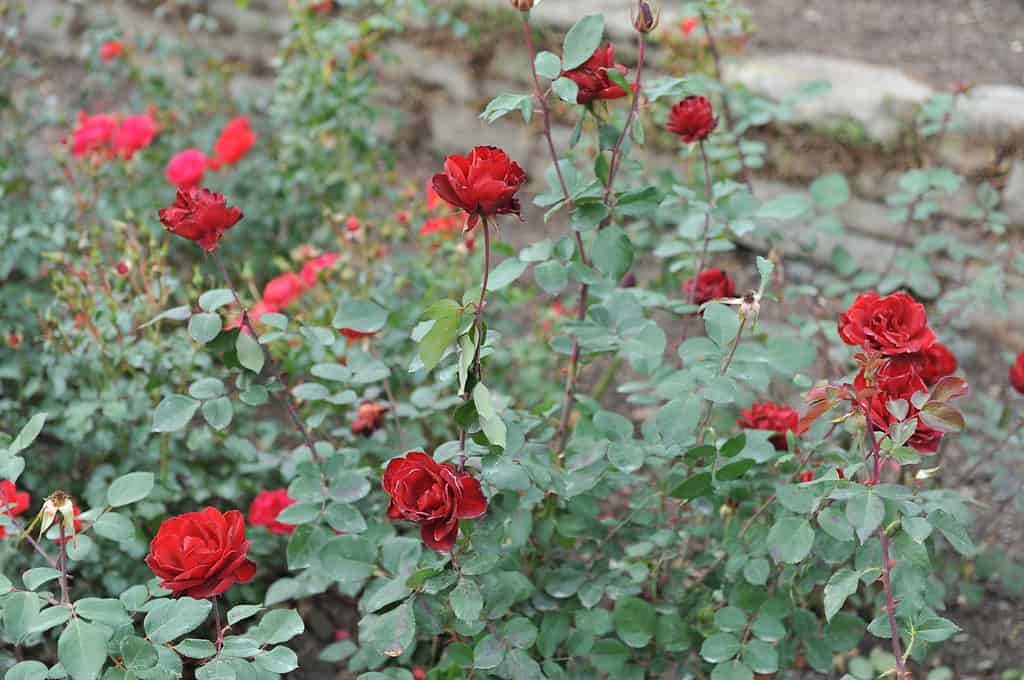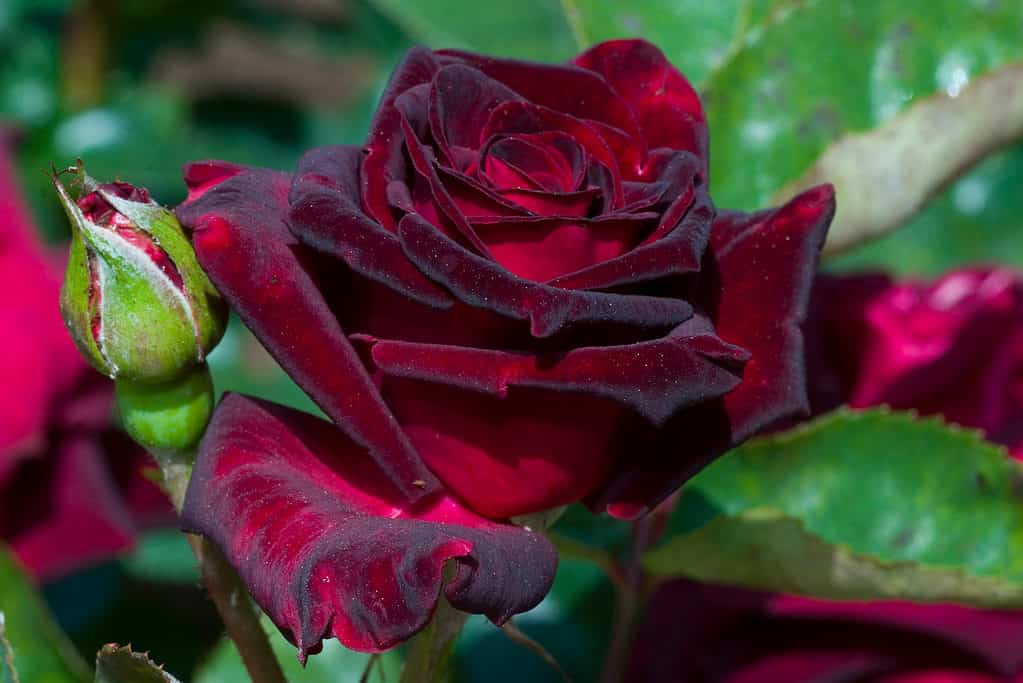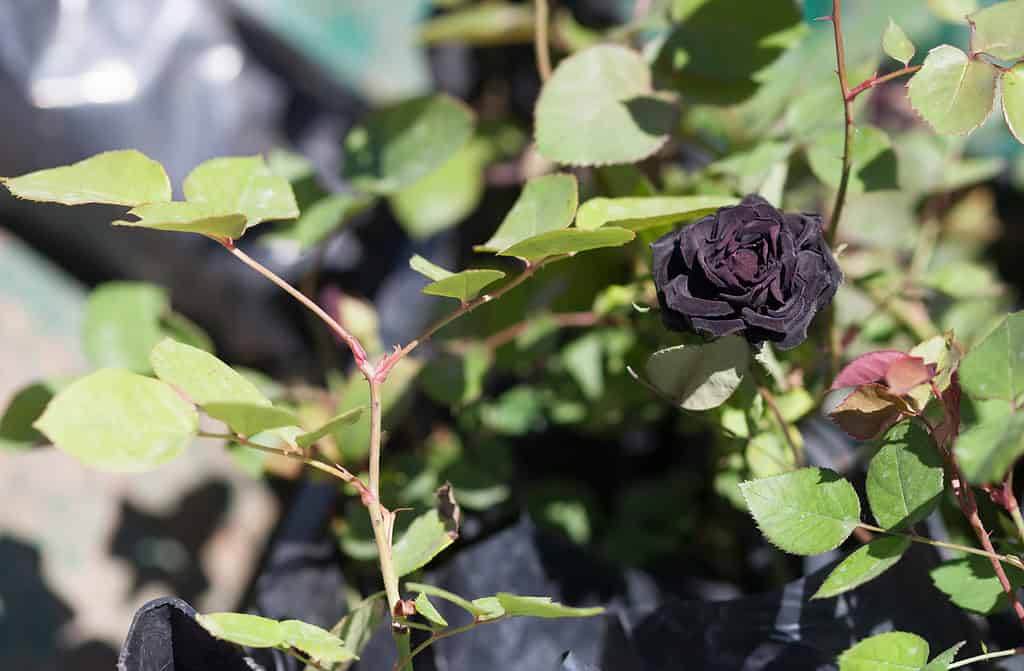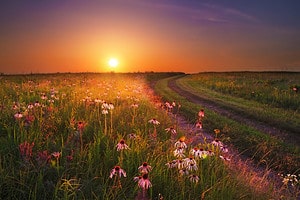The color black has long been linked with mystery, decay, and death. Examples include being the “black sheep” of the family, the black plague, and the underworld. Roses, in general, are a representation of love and warmth, as well as beauty, health, and romance. The mysterious and the beautiful are combined in the black rose, a mixture of two opposites.
But are black roses actually real? Is it possible to find a real rose to grow in one’s garden that is black and not just dyed black? In this guide, we’ll explore all of the unique qualities of the black rose, its history, its meaning, and a few common varieties to choose from
What Do Black Roses Mean?
Black roses are among the most exquisite flowers in the world because of their very profound hue. It appears astonishing that a live plant can produce flowers in such a dark shade and turn the connotation around to be where life meets death because black has long been associated with death, pessimism, sorrow, and mourning.
The black rose is frequently used as a death and bereavement emblem. The death card from the tarot decks is where this idea originated. The white rose on the death card symbolizes fresh starts after death, allowing one to find the silver lining in a terrible circumstance and hold out hope for a better future. On the other hand, black flowers stand for living life without hope for happiness or a chance to return to the past.
Leaving the depressing aspects of its meaning aside, black roses are also considered a sign of fresh starts and a positive representation of rebirth. As a result, it might be given as a present to someone beginning a new chapter in their life or used in literature to hint at a character’s impending shift.
Do Black Roses Exist Naturally?
It is this mystery that makes black roses such a well-liked flower. However, the true question is whether they actually exist in nature or are the result of human activity. The solution entirely favors human intervention, indicating that true black flowers are dyed rather than naturally occurring.
Black coloration in plants is highly uncommon, if not impossible, according to science. In actuality, horticultural plant varieties are the only ones with this. Only by putting specific rose plants into breeding programs and propagation processes may black roses be developed, albeit even this does not ensure fully colored black roses. Applying a black dye to the rose bushes or blossoms is another technique that may be used.
In actuality, tinted black roses are your best option if you want to create a unique vibe for a wedding or other event when surrounded by black roses because natural black roses do not exist. The good news is that the flower industry always has an alternative ready; in this case, black-tinted roses, which unfortunately cannot be found in nature. Even though they are fake, tinted black roses are stunning. In most cases, they are originally white roses that have been colored to give them a deep, smoky appearance. Any occasion may benefit from their added romance and elegance, which gives the event a mysterious yet feminine vibe. A different option is to encase the blossoms in black wax, though this is less common.
All of this being said, quite a few black roses varieties out there have been created via cross-breeding. While these roses aren’t truly black, they are very close!
Black Rose Varieties
Black Ice Rose
Botanical Name: Rosa ‘Black Ice’
The Iceberg rose, which is known for its strong lineage, gave rise to the cluster-flowered Black Ice floribunda rose, which bears a similar name. These amazing roses feature black buds that develop into stunning crimson blooms that bloom throughout summer and into the fall. They increase in height by two to three feet.

The Black Ice rose (pictured) has black buds that eventually turn bright red.
©Sergey V Kalyakin/Shutterstock.com
Black Baccara Rise
Botanical Name: Rosa ‘MEIdebenne’
In 2005, this bloom was created. It has no scent, yet despite this, it has a stunningly dark, almost black blossom and a gorgeous deep scarlet tint when it blooms. Black Baccara roses were first created for the cut flower industry because of their extraordinarily extended vase life and distinctive color. The Meidebenne version of the Black Baccara hybrid tea rose was released to consumers in 2004. However, it has since been shown that it lacks a high level of disease resistance. Despite having a weak scent, the Black Baccara Rose lends a sense of mystery and intrigue to whatever garden it is fed.

The Black Baccara rose (pictured) has a velvety black appearance.
©COULANGES/Shutterstock.com
Black Magic Rose
Botanical Name: Rosa ‘Black Magic’
The black magic rose is a Guinee rose child, and it has inherited the Guinee rose’s strong Damask fragrance and deep red hue. The black magic rose is a climber with big flowers that bloom for a very long period. These magnificent blossoms may reach a height of 10 feet and emit a potent fragrance that permeates the entire garden. The black magic rose is robust, disease-resistant, and incredibly well-liked by rose fans all around the world. The black magic rose frequently takes this shape because its bud is particularly dark and gives the appearance of a black rose. With its gorgeous dark green leaves and rich crimson velvety petals, it has a wonderful appearance.
Black Beauty Rose
Botanical Name: Rosa ‘Black Beauty’
This enormous hybrid tea rose with a rich red hue was initially made available in France by Meilland in 1954. The backside of the petals has a dark velvety black-red appearance at the bud stage.
Black Cherry Rose
Botanical Name: Rosa ‘JACreflo’
Huge, practically black blooms give this lovely heritage rose its charming name. It has roses that are around three to four inches broad, rich maroon in color, and odorless.
Halfeti Black Rose
Botanical Name: Rosa ‘Halfeti’
This exceedingly uncommon flower can only be seen in the little Turkish town of Halfeti. Due to a certain pH level of the soil there, even though it blooms a dark red hue, it changes to a somewhat black tint later and goes pitch-black when it is fully mature.

This Turkish rose (pictured) is one of the blackest roses on the market today.
©acsen/Shutterstock.com
Black Jade Rose
Botanical Name: Rosa ‘Black Jade’
Strong stems of the black jade rose may support clusters of five to 10 flowers. Like most of its black rose relatives, the black jade rose is nearly black in the bud stage, but when it opens, the dark petals are contrasted by dazzling golden stamens. The black jade rose is a shrub that blooms often, has glossy leaves, and is very disease-resistant. It can grow up to three feet tall. The rich, dark crimson black jade rose blossom becomes black in hotter conditions. In cooler conditions, it maintains a rich red hue. In various regions of the world, it is also known as the BenBlack rose.
Black Velvet Rose
Botanical Name: Rosa ‘Black Velvet’
This rose looks black and velvety and has a rich burgundy color. This rose is well-liked in the perfume business and has a strong aroma. Every year from the summer into the fall, it blooms quite beautifully.
Artificially Dyed Black Roses
Botanical Name: N/A
Because black roses don’t really exist in nature, most will opt for artificially dyed black roses. If you are looking for true black roses to put in a flower arrangement or bouquet, opting for dyed black roses is the most economical and stress-free option. You won’t be able to grow black roses from these cuttings, but they are a cheap way to add some moody flair to your bouquet.
These beautiful roses may not be black, but they are still stunning. These varieties would look beautiful in a rose garden for an added sense of moodiness. And if you need truly black roses for a bouquet, opt for artificially dyed black roses.
The photo featured at the top of this post is © iStock.com/iljacker
Sources
- NCSU Staff, Available here: https://plants.ces.ncsu.edu/plants/rosa/
- Sheryl Geerts, Available here: https://www.bhg.com/gardening/flowers/roses/ultimate-rose-care-guide/
- Hazelle C., Available here: https://florgeous.com/black-roses/
FAQs (Frequently Asked Questions)
Do black roses exist in nature?
A vast majority of black roses are dyed. Cultivated varieties that appear black may actually just be very deep shades or red or purple.
What do black roses symbolize?
Black roses usually symbolize death, sorrow, and other somber emotions.
Do black roses have any positive qualities?
While often associated with death and sadness, black roses can also be symbols of rebirth and new beginnings.
Thank you for reading! Have some feedback for us? Contact the AZ Animals editorial team.






